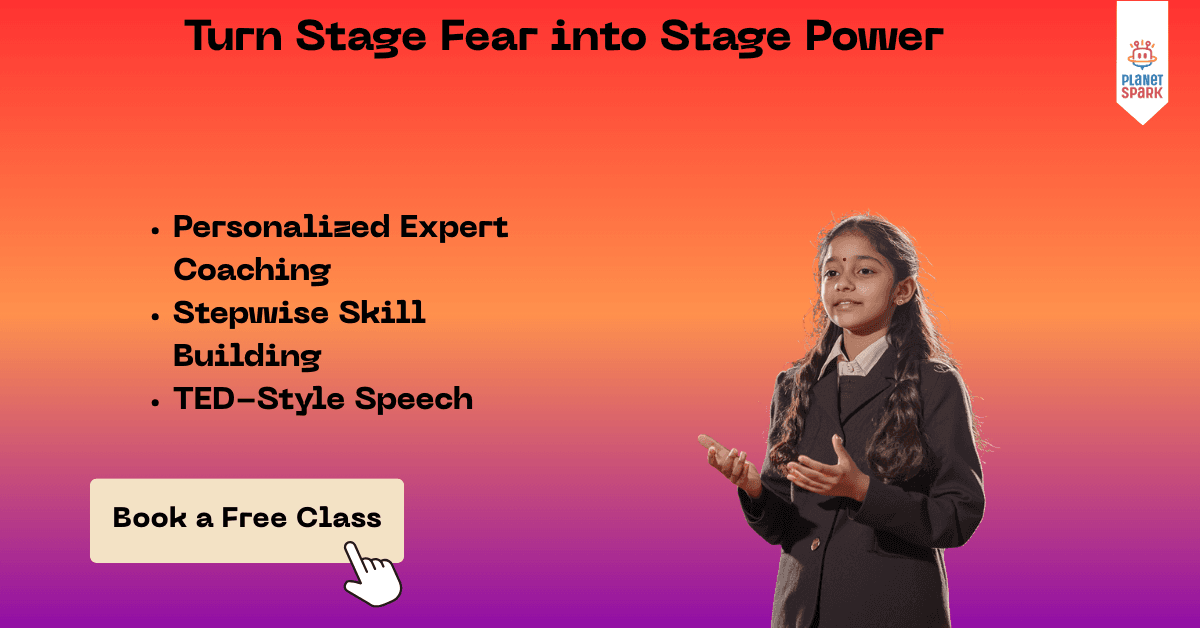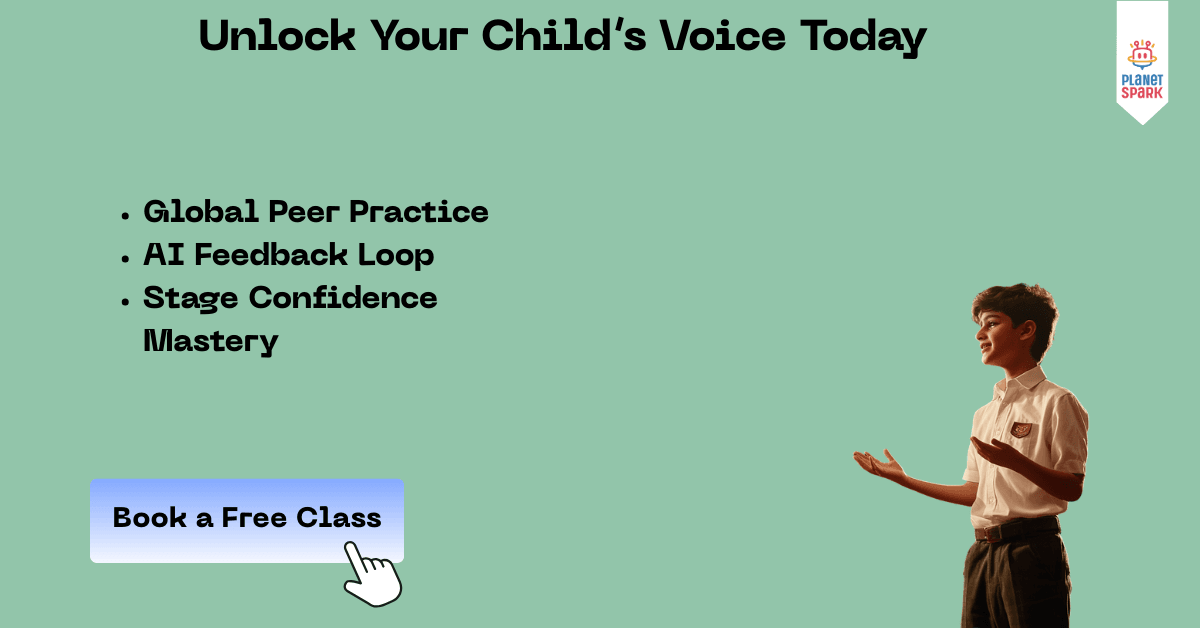Storytelling for Kids: Build Confidence & Literacy

Table of Contents
- Why Talking About Story Skills Is Important for Kids
- Tips to Make Kids Start Talking About Stories
- Why Parents Should Focus on Storytelling Skills
- Why Talking-About-Stories Skills Matter
- Practical implications for parents and educators
- Age-wise milestones and suggested goals
- Evidence-backed activities & games (ready to use)
- Sample 8-week lesson plan (for after-school or structured co
- Assessment rubrics and progress indicators (teacher/parent c
- Integrating technology in practice (PlanetSpark-style practi
- Parent scripts: short prompts for story time
- Classroom management tips for storytelling sessions
- Monitoring impact: KPIs to track program success
- PlanetSpark’s Public Speaking and Storytelling Courses for K
- How PlanetSpark Builds Storytelling Confidence Step-by-Step
- Conclusion
In today’s world, communication is one of the most powerful skills a child can develop. The ability to speak clearly, confidently, and creatively not only boosts academic performance but also strengthens social and emotional intelligence. One of the most effective ways to nurture communication skills is through talking about stories. Whether it’s narrating fairy tales, retelling fables, or sharing personal experiences, stories have a magical way of building vocabulary, improving expression, and sparking imagination.
At PlanetSpark, we specialize in helping children unlock their communication potential through engaging and interactive Public Speaking Courses for Kids. Our programs are designed to make children fall in love with storytelling, presentation, and self-expression. With personalized learning, AI-powered tools, and gamified modules, PlanetSpark ensures every child learns to speak with clarity, confidence, and creativity. If you are a parent looking for ways to improve your child’s storytelling and communication skills, this guide will give you actionable tips and explain how structured learning at PlanetSpark can make all the difference.
Why Talking About Story Skills Is Important for Kids
Improves Linguistic Skills
When kids talk about stories, they practice using new words, sentence structures, and expressions. This enhances vocabulary, grammar, and overall fluency.
Encourages a Love for Reading
Storytelling sparks curiosity. When children enjoy listening and retelling stories, they naturally develop a lifelong love for reading books.
Boosts Imagination and Creativity
Through stories, children learn to visualize scenes, characters, and emotions. Retelling these stories enhances their creativity and critical thinking.
Strengthens Emotional Intelligence
Narrating stories helps kids understand different perspectives, emotions, and situations, making them more empathetic and emotionally aware.
Builds Confidence and Public Speaking Skills
Every time a child narrates a story, they practice speaking in front of others, which builds confidence and prepares them for presentations, debates, and stage performances.

Tips to Make Kids Start Talking About Stories
Read Stories to Your Kids
The first step in developing storytelling skills is exposure. Read bedtime stories, folktales, or even personal experiences. Make it engaging, use different voices, emphasize expressions, and let your child join in by reading parts of the story.
Attend Storytelling Events
Schools, libraries, and community centers often host storytelling sessions. Taking your child to these events lets them watch skilled storytellers in action, helping them learn voice modulation, pacing, and expression.
Make Kids Listen to Audiobooks
Audiobooks are a wonderful way for kids to hear proper pronunciation, tone, and rhythm. They also expose children to diverse voices and storytelling techniques that they can later mimic.
Let Kids Choose Their Stories
When children select stories themselves, be it fairy tales, comic books, or myths, they feel more connected and motivated to narrate them. Choice encourages ownership, making the experience more enjoyable.
Practice String-a-Long Story Games
This fun family game sparks creativity. Start with “Once upon a time,” and let each family member add a line. The rule is simple: each addition must connect to the previous one. This builds listening skills, imagination, and fluency.
Use Expressions and Voice Modulation
Storytelling is not just about words; it’s about delivery. Encourage your child to use hand gestures, change tone with emotions, and maintain eye contact. For example, a loud voice for anger, a soft voice for fear, and exaggerated expressions for humor.
Craft Memorable Endings
Children remember stories with strong conclusions. Encourage your child to add morals, rhymes, or catchy one-liners at the end of their stories. This helps them connect lessons with narratives and makes their storytelling impactful.
Keep Storytelling Interactive
Instead of a one-way narration, make it conversational. Pause during the story, ask your child questions, or let them predict what happens next. This keeps them engaged and actively thinking.
Why Parents Should Focus on Storytelling Skills
Parents often focus on academics, but communication is just as important. Storytelling prepares children for interviews, group discussions, and stage presentations. It also boosts confidence in school activities such as drama, debates, and project presentations. By developing storytelling skills early, you are giving your child an essential life skill that will benefit them personally, academically, and professionally.
Spark your child’s love for writing. Claim your free trial session!
Why Talking-About-Stories Skills Matter
Research snapshot: what the evidence shows
• Early narrative ability predicts later reading comprehension and writing performance. Children who can tell structured stories at school entry tend to achieve stronger literacy outcomes in later years.
• Interactive read-aloud approaches that turn reading into a conversation reliably improve oral vocabulary and pre-reading skills, especially for children who begin school with smaller vocabularies.
• Listening to well-produced audiobooks supports pronunciation, fluency, vocabulary exposure, and comprehension, and gives struggling readers access to more complex language models.
• Cognitive and neuroimaging studies indicate storytelling activates brain networks involved in language, visual imagery, and social cognition, suggesting storytelling is a holistic learning activity (language + imagination + emotion).
• Narrative-focused teaching (where children tell and retell stories using targeted language features) accelerates narrative complexity and improves pragmatic language and storytelling structure.
Practical implications for parents and educators
Make reading interactive by using conversation-based techniques: ask open questions, expand on child responses, and invite predictions and retellings. Turn reading into a guided conversation, not a one-way activity.
Include audio exposure, complement book reading with audiobooks or read-aloud audio so children hear varied pronunciations, expressive prosody, and natural pacing.
Teach story structure explicitly, work with story elements (setting, characters, problem, events, resolution), and use story maps to help children organize ideas.
Repeated, pleasurable exposure to frequent, enjoyable storytelling (including repeated readings of favourites) supports word learning and memory.
Watch your child become a confident writer. Join a free trial session now!
Age-wise milestones and suggested goals
• Ages 3–4: Retell simple, familiar stories in sequence using short sentences; recognise characters and main events. Goal: expand vocabulary for emotions and actions; practise sequencing (first/next/last).
• Ages 5–6: Use more detailed sentences, causal links (because, so), and add simple character emotions and motives. Goal: scaffold to include beginning/middle/end.
• Ages 7–9: Produce longer narratives with descriptive details and attempt expressive delivery; can summarise and compare stories. Goal: strengthen voice modulation, richer vocabulary, and logical links.
• Ages 10+: Create multi-paragraph narratives, analyse character motives, and perform with dramatic elements. Goal: refine public-speaking techniques, persuasive storytelling, and critical reflection.
Evidence-backed activities & games (ready to use)
Each activity includes the primary learning target.
Dialogic Read-Aloud (target: vocabulary & oral language)
After a page, ask: “What do you think will happen next?” Encourage the child to respond and model richer vocabulary.
String-a-long Story (target: sequencing & creativity)
Family round-robin: start “Once upon a time…” Each person adds a sentence that connects logically to the previous line.
Story Map Race (target: story structure)
Provide a 5-box map (setting, character, problem, events, resolution). Read a short story; a child fills boxes, and add a light-timed element for fun.
Story Bag (target: descriptive language & improvisation)
Put 5 random objects in a bag. Child pulls 2 and must weave them into a short tale, focusing on describing objects and actions.
Audiobook Shadow Reading (target: fluency & pronunciation)
Play a short passage; pause and have the child read the same lines aloud, matching pace and intonation.
Emotion Mirror (target: emotional vocabulary & expressive skills)
Read a scene where a character feels a strong emotion. The child mirrors the facial/body expression and explains why the character feels that way.
Two-Voice Story (target: character differentiation & voice modulation)
Two kids play two characters and practise distinct voices and gestures. Record and review performance.
Moral Detective (target: inference & critical thinking)
After a story, the child states the moral and explains how events support it. Encourage concise, one-sentence endings.
Podcast Minute (target: concise storytelling & performance)
Child records a 60–90 second retelling with an intro, main points, and closing line. Review with a simple rubric (voice, clarity, pace).
Rewrite the Ending (target: creativity & cause-effect reasoning)
Child invents an alternate ending and explains why it makes sense within the story world.
Sample 8-week lesson plan (for after-school or structured course)
Week 1: Foundations: Introduce story elements & build vocabulary through short read-alouds and story maps.
Week 2: Voice & Expression: Role plays, two-voice stories, and expressive practice.
Week 3: Sequencing & Cohesion: String-a-long games and practise connectives (first, then, finally).
Week 4: Listening & Reflection: Audiobook shadow reading + group discussion and retell tasks.
Week 5: Improvisation & Creativity: Story bag, rewrite the ending, and improv prompts.
Week 6: Polishing Delivery: Focus on pacing, pausing, projection, and eye contact; record short performances.
Week 7: Performance Week: Children present a 2–3 minute story/podcast; peers give structured feedback using a rubric.
Week 8: Showcase & Reflection: Small showcase for parents; detailed progress report and next-step plan.
Turn ideas into stories. Start with a free creative writing trial class!
Assessment rubrics and progress indicators (teacher/parent checklist)
Use a 1–4 scale (1 = Emerging, 4 = Confident) for each dimension:
• Story Structure: Identifies beginning/middle/end and main events.
• Vocabulary & Expression: Uses descriptive words and varies tone.
• Sequencing & Cohesion: Links events logically with connectives.
• Pronunciation & Fluency: Speaks smoothly with minimal hesitations.
• Audience Engagement: Maintains eye contact, uses gestures, invites response.
• Creativity & Inference: Generates original ideas and draws logical inferences.
Turn rubric scores into a short narrative progress note and set 2–3 measurable goals for the next month (e.g., “Increase use of descriptive adjectives from 2 to 6 per story” or “Reduce filler pauses by 50% in a 90-second retell”).

Integrating technology in practice (PlanetSpark-style practical uses)
• Video analysis: Have children upload 60–90 second retells to a secure feedback tool; review machine feedback alongside trainer notes. Focus on two targets per video (e.g., slower pace; stronger opening).
• AI practice sessions: Use scaffolded prompts for independent practice (e.g., “Describe a day your pet saved the day, 90 seconds”). Instant feedback helps with pronunciation and pacing.
• Digital diary assignments: Weekly creative prompt plus one recorded oral retelling, combine written and spoken practice to strengthen coherence.
• Gamified warm-ups: Daily 5-minute vocabulary and grammar challenges to prime language before storytelling lessons.
Parent scripts: short prompts for story time
• “Tell me what happened first, then what happened next.” (sequencing)
• “How did the character feel when that happened? How do you know?” (emotion inference)
• “If you were that character, what would you do?” (perspective taking)
• “Can you say that sentence in a spooky/angry/whisper voice?” (voice modulation)
• “Finish this story in one sentence.” (concise endings and morals)
Boost creativity and writing skills. Enroll for a free trial class today!
Classroom management tips for storytelling sessions
• Keep sessions short and predictable for younger children (10–15 minutes); gradually increase duration.
• Use visual story maps and anchor charts with prompts for story elements.
• Celebrate small wins: a badge for “Best Voice” or “Most Creative Ending.”
• Use structured peer feedback: “One thing I liked… One thing to try next time.”
• Rotate roles: storyteller, listener(s), and observer (observer uses the rubric to provide feedback).
Monitoring impact: KPIs to track program success
• Oral vocabulary growth (compare pre/post assessments).
• Frequency of spontaneous retellings in class/home.
• Mean rubric score improvement across dimensions.
• Engagement in digital practice (minutes/week on AI sessions).
• Showcase readiness: percent of students who can present a 90–120 second story confidently.
PlanetSpark’s Public Speaking and Storytelling Courses for Kids
While parents can encourage storytelling at home, structured guidance from experts makes a significant difference. At PlanetSpark, we combine personalized coaching, technology-driven tools, and gamified learning to help children become confident communicators. Here’s how our program stands out:
1. 1:1 Personal Trainers for Every Child
Each student is matched with a certified communication expert. Trainers personalize lessons to match your child’s pace, style, and strengths. Real-time feedback ensures faster progress in fluency, storytelling, grammar, and public speaking.
2. Personalized Curriculum and Learning Roadmap
We begin with an assessment of your child’s skills. A customized learning plan focuses on grammar, vocabulary, fluency, and presentation. The roadmap is updated regularly to ensure continuous improvement.
3. SparkX – AI-Enabled Video Analysis Tool
Children upload their speeches or storytelling videos. AI analyzes voice clarity, posture, grammar, confidence, and flow. Detailed reports highlight strengths and improvement areas.
4. AI-Led Practice Sessions
Our virtual AI coach simulates real speaking activities. Kids practice speeches, storytelling, and responses while receiving instant feedback that builds consistency and confidence.
5. Spark Diary – Digital Writing Journal
Kids write daily reflections, poems, stories, or speeches in a personal digital diary. This builds writing confidence, creativity, and structured thinking.
6. Gamified Learning Modules
Fun quizzes like Antonyms Quiz, Word Wisdom, and Spell Knockout keep kids motivated. Grammar Guru challenges and daily quizzes make revision interactive and fun.
7. Structured Parent-Teacher Meetings
We conduct regular PTMs to share performance data and discuss progress. Parents remain fully informed and involved in their child’s growth.
8. Comprehensive Progress Reports
Our reports evaluate grammar, voice modulation, body language, and confidence. Trainer notes and action plans ensure measurable improvement.
9. Exclusive Clubs and Communities
Children join the Debate Club, Story Writing Club, Speech Circles, Comedy Club, Podcasting Club, and Writers Guild. These communities encourage teamwork, leadership, and creativity.
10. Sparkline – Safe Content Sharing Platform
Sparkline is a secure online space where children share videos, performances, and writings. It boosts digital expression and peer appreciation in a safe environment.
11. Contests, Showcases, and Recognition
We organize storytelling contests, debates, open mic sessions, and talent showcases. Certificates and recognition boost motivation and confidence.
12. SparkBee – Fun Language Quizzes
Engaging quizzes build grammar, spelling, and vocabulary. Rewards and challenges make daily practice exciting.
13. SparkShop – Digital Learning Library
A wide range of eBooks covering grammar, vocabulary, reading, and writing makes learning interactive, engaging, and accessible for kids.
Unleash your child’s imagination. Book a free trial session today!
How PlanetSpark Builds Storytelling Confidence Step-by-Step
Foundation Stage – Building vocabulary, sentence framing, and basic narration.
Skill Stage – Using expressions, voice modulation, and gestures.
Performance Stage – Practicing speeches, role plays, and storytelling games.
Advanced Stage – Public speaking, debates, podcasts, and competitions.
This progressive approach ensures that your child grows from a hesitant speaker to a confident storyteller and communicator.
Conclusion
Developing talking about stories skills for kids is more than just an extracurricular activity; it’s a life skill. From boosting vocabulary to improving imagination and emotional intelligence, storytelling offers countless benefits. While parents can create opportunities at home, structured learning with experts ensures children learn faster, better, and more confidently.
That’s where PlanetSpark’s Public Speaking and Storytelling Courses make a real impact. With personalized coaching, AI-powered tools, gamified learning, and exciting clubs, PlanetSpark provides children with the perfect platform to express themselves, shine on stage, and grow into confident communicators.
If you’re ready to help your child embark on this transformative journey, book a free demo session with PlanetSpark today!
Frequently Asked Questions
Yes. Storytelling not only develops speaking skills but also improves creativity, vocabulary, listening, and confidence in children.
Storytelling skills involve using expressions, voice modulation, and creativity to narrate stories in an engaging and impactful way.
Absolutely. Storytelling sessions train children to pay attention, focus on details, and understand different perspectives.
Start by telling them engaging stories, let them choose books, play storytelling games, and keep sessions interactive.
They help kids improve communication, boost imagination, build public speaking confidence, and develop a love for reading.
PlanetSpark offers 1:1 live classes, AI-powered feedback, gamified learning, and interactive clubs to help kids master storytelling and public speaking.
Children as young as 5 can start developing basic storytelling and speaking skills. PlanetSpark’s programs are designed for kids across different age groups.
Personalized Communication Report
Record a video to get a AI generated personalized communication report for your child

Hi There, want to try these
tips for your child with
LIVE with our expert coach?
Let's check your child's
English fluency
